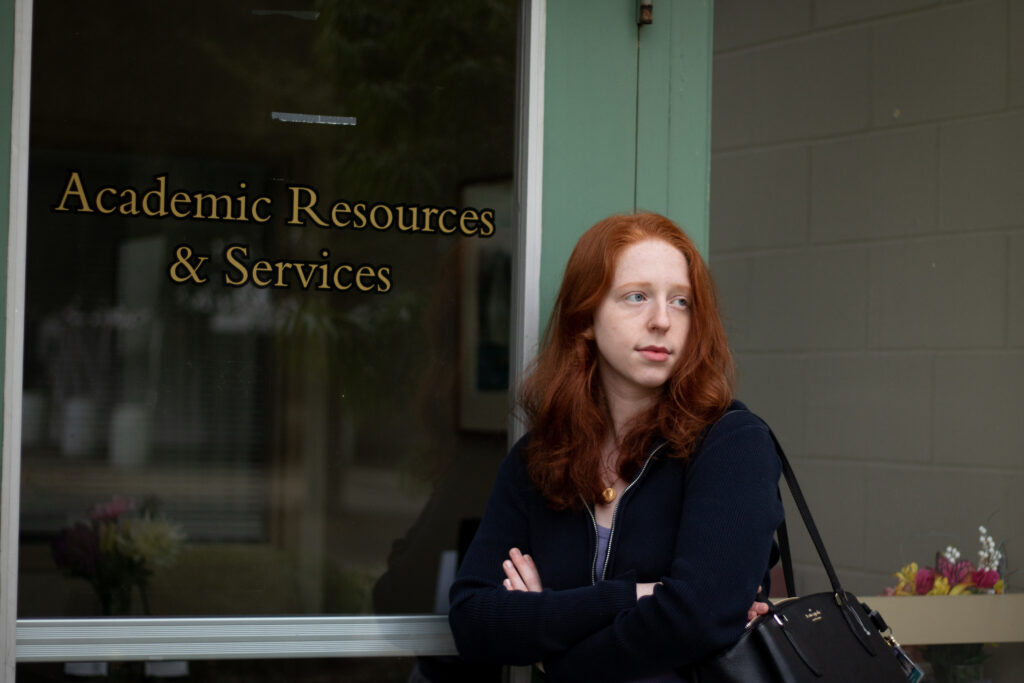Aviva V. Maxon ’24
Staff Writer
From classrooms to the Motley to the dorms, Scrippsies are sharing their experiences and frustrations with accommodations at Scripps. This ongoing issue that affects many of us does not seem to have an end or a single cause.
Academic Resources and Accessibility Services (ARS) is an office of Scripps College dedicated to accommodations and student academic services. ARS oversees all Scripps tutoring, including individual tutors, Math Spot, and the Writing Center. Nonetheless, most ARS resources and labor hours go to their other responsibility: accommodations.
ARS handles all types of accommodations in and out of classrooms. Housing accommodations, special meal plans, extra time on assessments, and acquiring a note taker are all taken care of by the office. Currently, they serve about 26.5 percent of Scripps students, which has increased from 16 percent in 2019.
To get accommodations from ARS, you need documentation from a medical provider or therapist. This is fairly straightforward for physical disabilities, but students have found acquiring documentation for mental health accommodations or learning disabilities is more challenging.
Grace Lyde ’23 was not able to receive accommodations because they do not have an official diagnosis. Trying to get accommodations during the pandemic, Lyde was not given any options other than getting an official diagnosis in order to receive the services she needed.
She has found that most professors are willing to give them extra time and are generally accommodating. However, getting a diagnosis can be incredibly taxing and expensive. Depending on health insurance, psychological testing can be thousands of dollars out of pocket.
This is prohibitive to many, not to mention the mental effort and distress this type of testing and navigating the healthcare system can have on students. “You need an official diagnosis and you don’t always have access to that,” Lyde said. “Pursuing diagnosis takes years.”
ARS requires documentation that shares what the student’s condition is and the impact on academics, housing, or environment. In addition to this, specification of the needed accommodations must also be submitted.
Danny Hernandez, Dean of ARS, sees the process for receiving accommodations as “simple and straightforward.” Sending documentation to their office is the first step and is followed by an hour-long interview with them so they can fully understand how to support the student. Once these are completed, accommodations are put into place.
While the process is simple, many students have had difficulty scheduling an intake meeting with anyone in the ARS office. At the beginning of the 2022 fall semester, ARS joined the other 5Cs in moving all accommodations to the AIM system. The change was a surprise to students, and many found that the website was difficult to navigate.
“It was only after the first three weeks of school [fall 2022] and a couple emails that I was informed by ARS that AIM was the new system for reporting documents for accommodations,” Rebekah Bodner ’24 said. “Once signing into AIM, I quickly noticed that the program was old and poorly formatted — something that looked and operated like it was out of 2008.”
Hernandez believes that the process is more streamlined through AIM, allowing for ARS to better serve the Scripps community. “We were very much using an antiquated process, meaning that I had to write every single accommodation letter manually, which took me weeks,” he said. “We saw a lot of colleges benefit from that [AIM system], meaning that they had more up to date data, they were able to track how many accommodations each student receives. It was a fairly efficient and quicker process not only for their staff, but for their students.”
Bodner, a student who was well-established with ARS, was prevented from receiving the accommodations she needed for the first month of the semester due to this confusion. Throughout the semester, she has had difficulty receiving adequate services from ARS.
She, like many other students, receives a distraction-free environment for test taking. The first time Bodner utilized this accommodation, ARS proctored the exam in the Dean of Students office, where multiple people were working and going about their daily business. The environment did not meet Bodner’s needs and since then she has relied on the Student Disabilities Resource Center (SDRC) to proctor any tests and exams.
The issues with ARS stem from two main issues: lack of funding and lack of staff. There are only four staff in the office, one of whom is an academic coach. This is fewer staff members than in 2019, while the number of students being served by ARS has nearly doubled since then.
Some students see opportunities for improvement through collaborative means. “They [ARS] should enlist the help of students with disabilities and faculty with disabilities who have experience in other institutions where that has been successful for them so that they can get ideas and potentially reform the policies they have so that they would better assist the people that they serve,” Bodner said.
While student accounts show how ARS has fallen short for them, there are still arguments to be made in favor of the community they have fostered. “We’ve cultivated a community where people feel comfortable, and people feel like these services are accessible,” Hernandez said. “I feel like as our numbers increase, it’s a testament to how inclusive we are as a community.”
Ultimately that is what everyone wants: a Scripps where everyone can grow, learn, and thrive at. “Offices like ARS would be more effective and supportive if they hired and welcomed students who used their services as a means of collecting feedback and implementing new policies and features,” Bodner said. “In my experience, this allows students with LDs to share helpful tips, strategies, and resources for navigating academic life at Scripps.”
Image Source: Ellen Hu ’24



